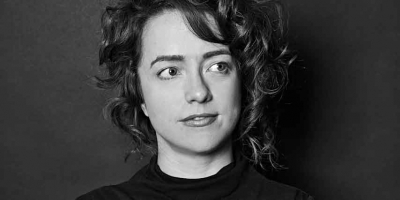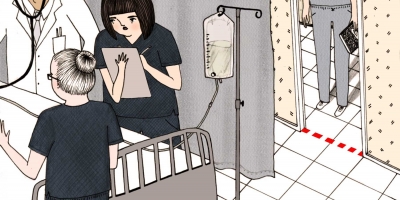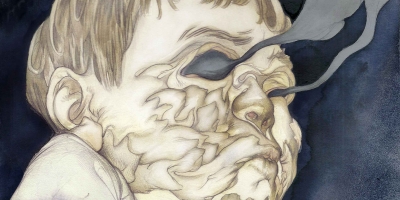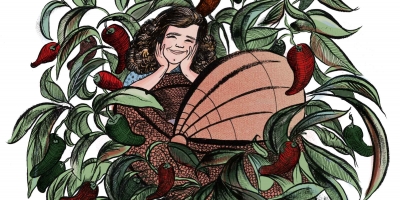Nonfiction
I Don’t Know What You’re Talking About
by Cyn Vargas

Now, I’m going to start out by saying I love my mother. She showed me how to make four quesadillas with one slice of cheese, and when I was growing up, she convinced me that walking everywhere would make me taller. I love her so much that I invited her to move in with me part-time three years ago, right after I had my daughter, Viviana.
Now a couple of things you should know. My ma is this petite woman who was too scared to ever learn how to drive, too scared of dogs, so scared of ever disagreeing with anyone that she tended to believe everything instead—this woman, my mother, crossed the border at eighteen all by herself, from El Salvador through Guatemala through Mexico and up to Los Angeles.
When I visited El Salvador for the first time, I understood why. My grandma lived in the tiny town of Cojutepeque and had just gotten a roof put over every part of the house except the bathroom, which meant the neighborhood boys would crawl up the tiny cinder-block house like flying cockroaches and peek over. Spotting an American girl was rare. It was like some kind of morbid bird-watching. My ma is the nervous and passive type, so I can’t imagine her making her way to a strange place alone, but she did—leaving behind her country, but not her upbringing.
My ma didn’t talk to me about what it meant to be a girl. You know? Feminine things. I learned that in school from a female teacher who told us girls to wash our hair twice a day when we had our monthly visitor because otherwise we could get lice. I learned how to apply lipstick from a friend because my mom never showed me how to put on makeup. My ma didn’t talk to me about how to shave my legs; they looked like they’d been caressed by Edward Scissorhands. When it came to cursing, drinking, or smoking, my ma never did any of those things, so it was a given neither should I.
It was simple. Don’t mention anything that had to do with me growing up and I would stay a little girl forever. So why did I expect anything different when it came to the sex talk?
I got the talk in our kitchen when I was fourteen, as my mother was making rice and I was stirring that neon-orange powder into the Hamburger Helper.
“Cynthia.”
I turned to her as she sprinkled more than enough salt into the boiling water. I knew it was something important because she didn’t use my nickname and she wasn’t making eye contact. For everyday conversations, I could see her brown eyes the shade of wet sand, and she’d sweetly say, “Cynderella, how was school today? Cynderella, I found a dollar bill on the floor and played the lottery. Cynderella, can you believe what your Tía Blanca was wearing?”
But when she got serious, she never looked at me and she always used my real name: “Cynthia, your grandpa died. Cynthia, your father left us. Cynthia, you have to switch schools again.”
So I knew there, in that kitchen, with the burning stench from the cheap pot and the imitation cheese disintegrating onto the noodles, that this was serious. Did she find out I forged her signature when I cut class to go hang out with the boy I liked (who spent that time hanging out with the girl he liked, which wasn’t me)? Were we really moving to Waukegan ’cause my aunt finally convinced her that I really was a gangbanger just because I wore baggy JNCOs and Cross Colors? Or was it the sex talk? I didn’t need the talk. I hadn’t even kissed a boy yet.
She finally said, “When it comes to…that.”
Oh my God, it was the talk. Did I really want to hear my mother tell me where things should go and not go? Or discuss the exchange of bodily fluids? And oh man, I hoped we didn’t have any bananas in the house.
She covered the rice and started to make her way out of the kitchen and said, “Wait ’til you’re married.” Then: “Turn the fire off in twenty minutes. I’m going to watch my novela.”
Really? Wait for what? I mean, I was a freshman in high school, and it was 1992. There was no accessible internet with millions of sex sites. I didn’t have cable that sometimes showed scrambled X-rated movies. I had a landline, a pager the size of a garage door opener, and my first Cabbage Patch Doll, named Stanley, on my dresser.
Now, I wasn’t a looker at fourteen. My breasts were the size of Ritz crackers, but I wore a bra anyway as encouragement to my chest, and my front teeth loved each other so much they spooned. I didn’t have boys whispering in my ear, “C’mon, girl. Let’s do it.” Hell, I didn’t have boys whispering, hollering, or monotoning anything to me, so sex was the very least of my thoughts. I just wanted to get to first base or even just out of the batter’s box.
But my hormones were like kernels popping in my body, and of course my eyes were set on a few boys at school: the quarterback of the varsity football team whom everyone called Hercules; the boy in my art class with the black glasses who told me I was like one of the guys and then made out with the pretty girl in our class; the boy two lockers down who always wore the gym shoes with the white tips, who was friends with everyone but so cool he hung out by himself.
Later that night, my ma and I ate dinner. She started updating me on her Spanish novela that I had no interest in because—now get ready for this one—my father was leaving us to be with my pregnant babysitter, who had left her boyfriend, who was best friends with my father. Real life was close enough to a novela for me. I nodded. I ate my fake pasta. I ate my oversalted rice and I thought about waiting ’til I got married. That would be a good girl thing to do, right? I could wear white for real, not like my cousin who wore a bleach-white wedding dress as her three kids sat in the front pew.
“I haven’t done anything,” I said.
My ma picked up her napkin, wiped her mouth, and said, “Good.”
I really just wanted us to be like one of those mother/daughter duos that were close and shared things, but I knew she wasn’t like that, and it wasn’t really her fault. I figured she probably got the same sex talk I did. It was probably handed down from generation to generation. I imagined my mom in El Salvador, plopped on the stoop of my grandma’s house as horses trotted along the street and stray dogs passed out from lack of food and too much heat.
“Espere hasta que se case,” my grandma said. Wait until you get married. Then she probably told her to make tortillas. I wouldn’t be surprised if that’s when my ma decided to leave for the States.
So I didn’t tell my ma, when six months later, I got my first kiss. It was nothing like in the movies. There was so much saliva it reminded me of my neighbor’s Saint Bernard. That boy got upset when I told him that a kiss was all he was getting, so he drove me home in his beat-up ride (I could see the snow through the rusted holes under my feet) and never spoke to me again.
I thought it was me until the next boy, sophomore year, and there was no drool. He said, “You’re a really good kisser,” and I smiled all cool and said, “Of course,” but inside, I was like, Fuck yeah, I can kiss! quickly followed by, Why is he squeezing my ass so hard? Then when I didn’t give it up, he broke up with me by playing Madonna’s “Like A Virgin” over the phone before hanging up on me. Two years later, we ran into each other at Burger King while he took my order. “Looking good,” his wannabe mustache fluttered. I saw better mustaches on the old ladies at the laundromat. I pushed out my newly formed boobs and said, “Give me my french fries, dude, and go fuck yourself.”
I didn’t share much of anything with my mother. As long as I got good grades and came home by curfew, my mother didn’t want to know anything else. So that’s the way it was for the years to follow. I was an honor-roll student for most of my high-school years, as well as a virgin.
Now, remember when I said my ma moved in with me after my daughter was born? It’s because she got laid off from her candy-factory job. In addition to the fact that there would be no more abundance of chocolate-covered pretzels or those fancy jellybeans, no job meant no paycheck, so she lost her apartment.
Not too long ago, when I got home, my ma said, “Viviana asked about where babies come from.” My daughter, at three and a half, apparently threw my mother for a loop.
“Well, what did you tell her?”
“Well, Cynthia, I told her to ask you and then put on cartoons.”
“You can tell her, you know.”
My mother just shook her head.
My need to confront the issues was tested at, of all places, Jiffy Lube. There my daughter sat in my lap as we waited in a room the size of a pantry, when the TV showed an actress pretending to be in labor.
“Why is she screaming, Mama?”
“Because she’s having a baby.”
“Where’s the baby?”
“In her stomach. You were in my stomach. We were connected here, see?” Eyes peered at us as I showed my daughter her belly button and she lifted my shirt to see mine. It was sweet, but I could’ve done without strangers catching a glimpse of my stretch marks that looked like Google maps.
“Mama, I want a baby sister. Put one in your tummy and eat jalapeños so it can come out.”
When I told my husband about this he said, “You’re giving her the sex talk when she’s older, right?”
“Mm-hm,” I said, “and not the wait ’til you’re married one-liner.” It’s a tradition I look forward to breaking by answering questions before they’re even asked.
So, for the last four years, I’ve sometimes felt like I have two kids—only I can’t claim the sixty-three-year-old as a dependent.
Now I’ve shown my ma how to apply foundation and lipliner, I’ve read up on menopause and talked to her about the symptoms. I even gave her her first glass of wine. But I still can’t get her to curse. One night, she sat on my couch, laughing into the phone, and I heard a man’s voice on the other side. When she hung up, I sat down next to her and said, “Ma, my house, my rules. Wait ’til you’re married.”





